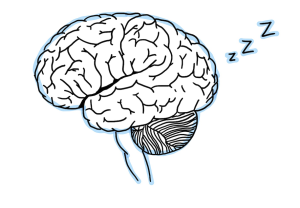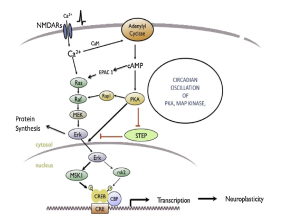
Sleep as we know consumes 6-8 hours of the average persons 24 hour day. Therefore, taking either 1/4 or 1/3 of your day. To say that sleep is important would be an understatement as it is very much needed for the brain to function.
Sleep is when our body takes a break to regenerate and goes through different stages throughout sleep. Those stages include wake, N1, N2, N3, and REM; stages N1 to N3 are considered non-rapid eye movement (NREM) sleep. The wake stage depends on if someone has their eyes open or closed in preparation of sleep, if the eyes are open beta waves are at play or if they are closed alpha waves are evident. Once the body begins to fall asleep stage 1 becomes apparent, the light sleep, which lasts a total of 5% for sleep time and has active theta waves. Stage 2 (N2) is when sleep spindles and K complexes are active and accounts for 45% of sleep. Sleep spindles have an important role in memory consolidation and K complexes function to maintain sleep and memory consolidation. Stage 3 is when the body repairs and regrows tissues, builds up bone, muscle, and strengthens the immune system. Stage 3 can also be referred to as deep sleep with the delta waves being most active and accounting for 25% of sleep. Lastly, REM sleep which has beta waves and is when dreaming or nightmares are most likely to occur.1
In time, older adults experience more insomnia and an earlier wake time possibly due to changing circadian rhythm that goes along with age. Therefore, imbalance of the circadian rhyme causes problematic secretion of melatonin and cortisol. Cortisol and melatonin are inversely related as an individual wakes up cortisol rises throughout the day and upon going to sleep melatonin rises and cortisol goes down. Other factors such as blue light have been shown to have an effect on sleep. Take for example how melatonin functions to be the hormonal signal for preparing the body to sleep and having melatonin disrupted by abnormal evening light exposure. This light exposure from the backlit of the computer or bright room setting causes reductions in melatonin secretion. Thus effecting sleep in ways such as prolonging sleep onset latency, decreasing rapid eye movements, and changing slow wave sleep.
Why does the blue light have more of an effect compared to white light? Well knowing that the circadian system has peak sensitivity to around 450-480nm light within the blue portion of the spectrum, blue light therefore can increase an individual’s alertness and suppress melatonin excretion. LEDs are in computers, TV, smartphones, tablets, as well as some light bulbs and have a blue range of around 460nm.2
Chemically in the brain there are a few pathways at play when sleep is activated. Those pathways include cAMP, MAPK, and CREB. It has been found that activity in these pathways is gone in memory deficient mice and that exposure to constant light may disrupt hioppocampal oscillations of MAPK activity causing deficits in contextual memory persistence. Therefore, if MAPK is inhibited at its peak activity it lowers the persistence of memory. Overall, cAMP, MAPK, and CREB pathways are found to be most active during REM sleep and having sleep disturbances especially during REM sleep may have impairments in hippocampus-dependent memory.3

Sleep is important and it is important to try and get the best sleep each night considering it may have a direct impact on your mental health status especially with age looking at memory function.
Work cited:
1. Patel AK, Reddy V, Shumway KR, et al. Physiology, Sleep Stages. [Updated 2022 Sep 7]. In: StatPearls [Internet]. Treasure Island (FL): StatPearls Publishing; 2023 Jan-. Available from: https://www.ncbi.nlm.nih.gov/books/NBK526132/
2. Shechter, Ari, Elijah Wookhyun Kim, Marie-Pierre St-Onge, and Andrew J. Westwood. 2018. “Blocking Nocturnal Blue Light for Insomnia: A Randomized Controlled Trial.” Journal of Psychiatric Research 96 (January): 196–202. https://doi.org/10.1016/j.jpsychires.2017.10.015.
3. Worley, Susan L. n.d. “The Extraordinary Importance of Sleep.”
4. Xia, Zhengui, and Dan Storm. 2017. “Role of Circadian Rhythm and REM Sleep for Memory Consolidation.” Neuroscience Research 118 (May): 13–20. https://doi.org/10.1016/j.neures.2017.04.011.